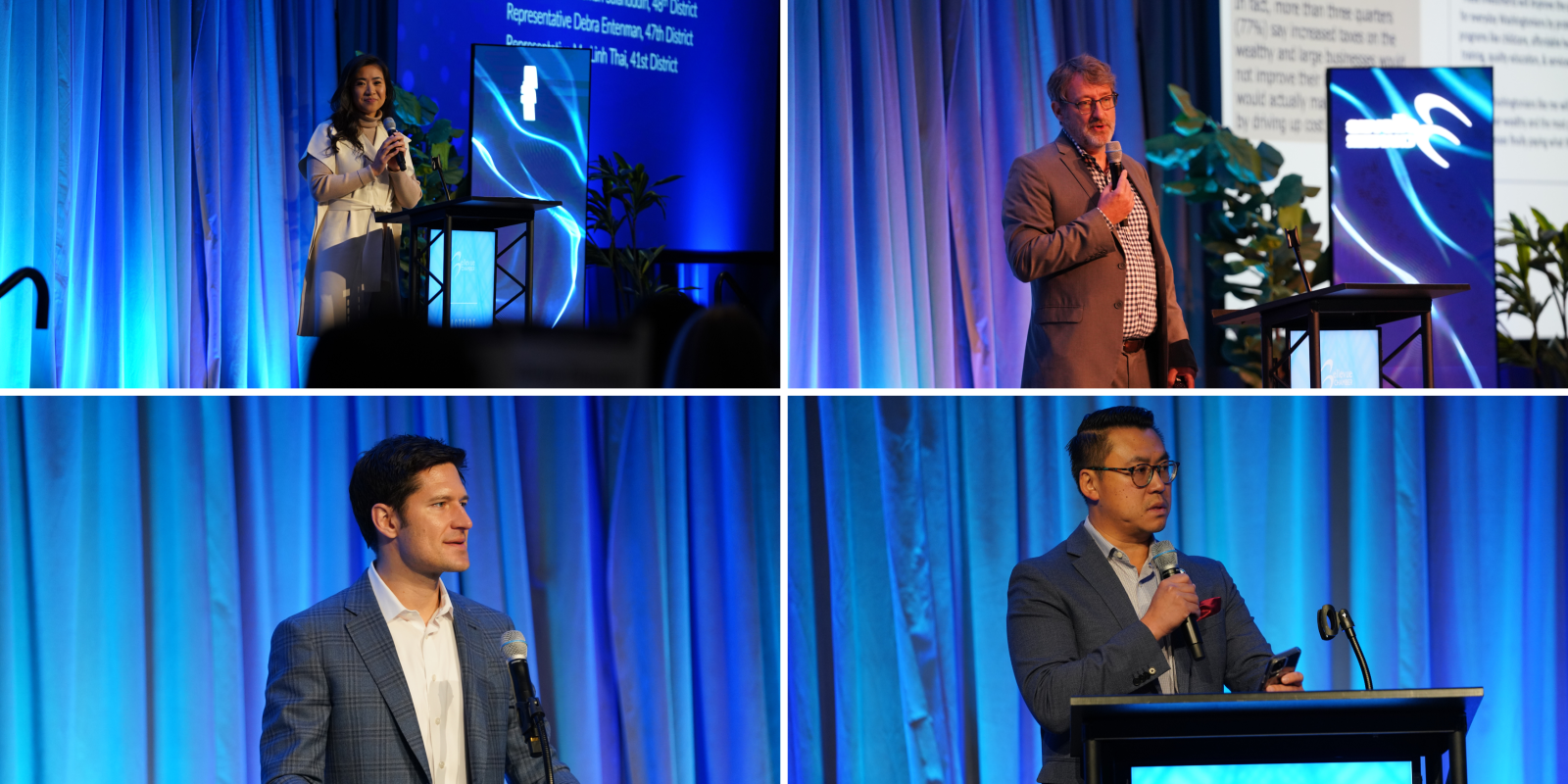ELC 2025 Recap: Real talk, practical fixes, Eastside energy
Hot coffee, sharper questions, and no sugarcoating ... This year’s Eastside Leadership Conference brought together leaders from business, government, and community to wrestle with the basics that matter most to Bellevue and the Eastside: Affordability, growth, safety, and the ability to actually deliver projects once we agree on them.
The thread through every session was pragmatic optimism, and we heard candid assessments, some concrete fixes, and a clear call for accountability from all. Get the gist of the conference below!

Pearl Leung (Amazon, top left), Andrew Thibault (Fulcrum Strategic, top right), Michael Mattmiller (Microsoft, bottom left), and Joe Nguyen (WA Department of Commerce, bottom right) kicked things off at this year's ELC.
Budgets & Results: Did Higher Taxes Deliver?
In our first round of breakouts, our panelists opened with the fact that recent tax changes grew from policy choices, not math inevitability. Our experts advocated for a process of transparently setting goals, measuring progress, and publishing timely data so residents and employers can see what their dollars produced, and education leaders noted real trade-offs in both higher education and K–12.
TLDR: Spending rose in some areas while outcomes were mixed, which argues for a back-to-basics focus and budgeting to results. Climate funding drew the same theme.

Todd Myers (WA Policy Center), Emily Makings (WA Research Council), and Chris Riley-Tillman (WSU) sat down for a breakout room panel moderated by Kevin Wallace (Wallace Properties).
Cost of Regulation: Friction is the Hidden Tax
AWB's Emily Wittman graced us with a presentation of their "Cost of Regulation" report, and the conversation was not only about how many rules we have, but rather was about how they overlap, duplicate, and delay. Employers pointed to health care cost increases and licensing timelines that slow hiring, and solutions on the table included sunsets and regulatory budgets, one-in one-out rules, alignment with federal standards where appropriate, and one-stop digital portals so businesses are not re-entering the same data.
Why it matters? Clearer definitions, fewer duplicative steps, and predictable timelines actually end up helping small firms most, and honestly, that is a competitiveness win we can deliver.
Quiet Quitting Washington: The Trend to Watch
Wealth managers and entrepreneurs have their sights set elsewhere, with leaders describing a softening sentiment as costs rise. Some residents and founders are quietly adjusting their footprint in state or timing transactions differently to manage exposure to specific taxes, while others are leaving altogether.
According to these folks, the cure is not partisan theater: It is practical adjustments on affordability and competitiveness, paired with direct dialogue and better data from employers on what policy changes tangibly mean for hiring and investment.

Dean Deutz (RBC Wealth Management) and Collin Hathaway (Flint Group) discuss why people are exiting Washington in a breakout room panel moderated by Kari Magill (Rowley Properties).

Top Journalists on the Olympia beat: Anna Edgerton (Bloomberg), Bill Lucia (Washington State Standard), Jim Brunner (The Seattle Times), and moderator Jill Jackson (Monument Advocacy) sit down for a discussion about covering government.
Business Community on the Offense: Align & Hand Over the Mic!
This session felt like a locker-room huddle for business organizations and advocates, especially following the last legislative session. The big win in (and around) Olympia was alignment, as Chambers and statewide partners coordinated better than ever, thus amplifying visibility and setting a stronger tone heading into 2026.
The bare-bones plan for next session is to keep the coalition together, continue to hand the microphone to employers and employees who live these policies every day, and expect more on-the-record stories and more in-district conversations.
Rachel Smith (Washington Roundtable) and Joe Fain sit down to talk about lessons learned from the 2025 session and how the business community is going on the offense for 2026.
Executive Insight: Where the Next Dollar Goes
C-Suite execs popped up on our mainstage with a half-statement, half-warning: If you want to know where the next dollar lands, follow predictability. Executives were clear that most employers are fine paying their share, but frequent and unpredictable shifts in tax policy make long-term planning harder and push investments toward places with stable ground rules.
In short: Show fiscal responsibility and accountability before asking for more. Location choices are real, and companies with hubs in Bellevue and in other states will place new dollars where timelines are clearer and costs are manageable.
(Even when a firm stays rooted here, incremental headcount and capital can flow elsewhere if the rules change mid-stream!)
Teresa Hutson (Microsoft) talks about how high taxes and Washington's policies are driving businesses and people away from the state, and the need to incentivize them to stay.
Matt Steuerwalt (PSE) talks about how permitting bottlenecks in Washington are limiting progress, and how PSE finds it easier to do business in Montana.
Jaime Drozd (DWT) talks AI, how it is impacting lawyers, and how it also poses a huge opportunity.
Why Nothing Works: Restoring Authority & Accountability
Our closing conversation with keynote Marc Dunkelman tackled a hard truth with humor and history, as we used his recently published book and included case studies to help us get a better sense of what is happening in our own state. Energy, infrastructure, and governance dominated the chat, as Dunkelman and our very own Joe Fain detailed how layered reviews, overlapping jurisdictions, and litigation as the default create too many veto points and not enough authority to deliver.
Our President and CEO Joe Fain sat down with Marc Dunkelman (Brown University, and author of "Why Nothing Works: Who Killed Progress―and How to Bring It Back") for our keynote presentation at ELC.
